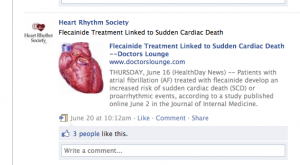December 24th, 2011 by John Mandrola, M.D. in Opinion
1 Comment »

You may have heard that AF is a tough disease to understand. Questions far outnumber answers.
What causes AF?
Why do some not feel it at all, while others are incapacitated?
What’s the best treatment? Drugs? Ablation? Surgery? No treatment?
Should I take a blood thinner…and which one?
Where should one go for the best AF care?
This short email from a reader captures the essence of AF support group mayhem: Read more »
*This blog post was originally published at Dr John M*
October 14th, 2011 by John Mandrola, M.D. in Opinion, Research
No Comments »

The news wires for atrial fibrillation were abuzz this last week. The vigor and speed with which health news travels is striking.
Since 2.6 million Americans live with AF, my guess is that many are looking at the release of the Medtronic-sponsored TTOP-AF trial with anticipation. Here is a link to the press release. The trial purported to show benefits of Medtronic’s novel phased RF ablation system in treating persistent AF.
The study was small and released at a relatively small symposium in Venice, Italy. The TTOP-AF trial randomized 210 patients with persistent AF (including flutter) to either ablation with Medtronic’s ablation system or conventional therapy with drugs and cardioversions.
They found, not surprisingly, that AF ablation reduced AF burden. AF ablation significantly reduced AF burden in 55.8% percent of patients versus only 26% of those treated with conventional medical treatment. Editorial comment: That kind of data is pretty typical.
The problem with the study Read more »
*This blog post was originally published at Dr John M*
October 2nd, 2011 by John Mandrola, M.D. in Opinion
No Comments »

You have probably read that experience makes for better doctors.
And of course this would be true–in the obvious ways, like with the hand-eye coordination required to do complex procedures, or more importantly, with the judgment of when to do them.
There’s no news here: everyone knows you want a doctor that’s been out of training awhile, but not so long that they have become weary, close-minded or physically diminished. Just the right amount of experience please.
But there’s also potential downsides and struggles that come with experience. Tonight I would like to dwell on three ways in which experience is causing me angst.
But first, as background…
It was the very esteemed physician-turned-authors, Dr. Groopman and his wife, Dr. Hartzland, who wrote this thought-provoking WSJ essay–on how hidden influences may sway our medical decisions–that got me thinking about how I have evolved as a doctor. They were writing from the perspective of the patient. But in the exam room, there are two parties: patient and doctor.
# 1) The sobering view that experience brings: Read more »
*This blog post was originally published at Dr John M*
July 6th, 2011 by John Mandrola, M.D. in News, Research
No Comments »

I have said that the best tool for treating atrial fibrillation (AF) is education. I still strongly believe this, perhaps more then ever.
AF presents itself to people in so many different ways–from no symptoms to incapacitation. Likewise, the treatments for AF range from simple reassurance and lifestyle changes, to taking a medicine, and on to having a complex ablation[s].
Because knowledge is so important to patients with AF, I encourage them to do outside research. This surely means going on-line. The problem, of course, comes with assessing the quality of information. It reminds me of what an old professor used to profess, “no data is better than bad data.”
What’s more, the vast diversity of AF makes comparing notes with friends problematic. One person’s wonder drug may be another’s poison.
Last week, this provocative AF headline came through on one of my Google Alert emails: 
“Flecainide Treatment Linked to Sudden Cardiac Death.” Read more »
*This blog post was originally published at Dr John M*
May 6th, 2011 by John Mandrola, M.D. in Health Tips
2 Comments »

The number of emails that come from fellow cyclists (and endurance athletes) with heart rhythm issues amazes me. I am more convinced than ever that our “hobby” predisposes us to electrical issues like atrial fibrillation (AF)—that the science is right.
Obviously, my pedaling “habit” creates an exposure bias. I hear from many of you because we cyclists understand each other. Like you, I consider not competing a lousy treatment option.
As a bike racer, I know things: that prancing on an elliptical trainer at a health club doesn’t cut it, and, that spin classes may look hard, but do not come close to simulating real competition. I know the extent of the inflammation required to close that gap, to avoid getting dropped when one of the local Cancellara-types have you in the gutter in a cross-wind, or the worst one of all, to turn yourself inside out to stay with a group of climbers over the crest of a seemingly endless hill—”ten more pedal strokes and I’m out”…Then ten turns to 20, then 40, and maybe you hang, and maybe not. The common denominator of all this: suffering.
It’s little wonder that we get AF.
With that as a backdrop, my goal for this post is to provide a modest amount of insight to the most common question asked by athletes with AF.
“Should I have an ablation, or not.”
Though my two episodes of heart chaos amount to only a mild case of AF, I think it’s fair to say that personal experience with a problem helps a doctor better understand your choice. I’ve thought to myself, on more than one occasion, what would I do if the watt-sucking irregularity persisted? Would I have an ablation; would I live with it; would I stop drinking so much coffee? Read more »
*This blog post was originally published at Dr John M*












